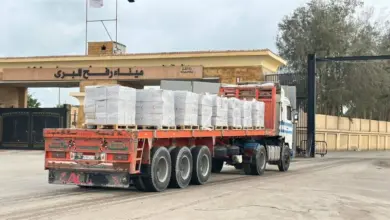JERUSALEM – Whatever threats Israel faced in recent decades from Lebanon, Syria and the Palestinian territories, it could always feel confident that Egypt was covering its back in the far south.
Thursday's assault by militants who crossed the largely unprotected desert border with Egypt confirmed Israel's fears that its security problems are multiplying following the fall of former Egyptian President Hosni Mubarak in February.
Eight Israelis died in the attacks near the Red Sea resort of Eilat, and although officials were quick to absolve Egypt of any collusion in the strike, they voiced grave concern about growing lawlessness in the barren Sinai Peninsula.
The attack, blamed on Palestinian militants from nearby Gaza, has left Israel in the uncomfortable position of being both threatened along one of its flanks, yet militarily hamstrung by a deal with one of its few Arab peace partners.
Egypt has rebuffed accusations that it has lost its grip on the area, with South Sinai Governor Khaled Fouda telling Reuters on Friday the situation is "stable and under control."
But Israel will certainly beef up security along its 266km frontier with Egypt.
"The border with Egypt is no longer a peaceful border and we need to change the way we treat it," opposition leader Tzipi Livni said on Friday while visiting the wounded in hospital.
"Until today we treated it as border with infiltrators who wanted to find work. But it has become a border that is crossed by those who want to take our lives," she added.
Israelis believe the Palestinians could not enter Israel via its heavily guarded border with Gaza, and instead slipped into the Sinai from where they entered southern Israel. Witnesses said they were disguised as members of the Egyptian security forces.
One of the immediate results of the killings will be swifter construction of a border fence that the army now hopes will be completed next year. Military sources have also said Israel will bolster an Eilat-based commando unit.
But there is a gnawing worry that without determined Egyptian action, Israel will remain vulnerable.
"This region is breached and there are terrorist, al Qaeda infrastructures there from where this attack was developed and born," said Brigadier-General Yoav Mordechai, Israel's armed forces spokesman.
Israeli officials say Egypt's military rulers do not appear to have the same control over their country as Mubarak once wielded. They also fear that Cairo no longer sees safeguarding its Jewish neighbour as a top priority.
The terms of the historic peace treaty signed by Israel and Egypt in 1979 help explain Cairo's problems. The accords called for the demilitarization of central Sinai and only allows Egypt to deploy a small number of lightly armed border guards there.
However, security has clearly deteriorated since February, with assailants twice blowing up a pipeline bringing gas to Israel. Only days ago, Israel approved an Egyptian request to deploy 1,000 more troops to the area, local media reported.
Israel's hands are also tied. It has had little compunction about striking deep into the territory of other neighbours when it has felt threatened, but its cherished Camp David peace treaty means such overt operations within Egypt are out of the question.
That leaves Israel with the risky option of covert missions, discovery of which could fray what trust remains with Cairo's interim military leaders and an Egyptian populace that is overwhelmingly pro-Palestinian.
Nationalist politicians are already raising calls for a rethink of relations with Egypt.
"The attack in the south is another stone falling from the tower of delusion about the peace treaty with Egypt," said Michael Ben Ari, a parliamentarian with the National Union party. "It's time we understood that there is a dangerous entity in the south that is cooperating with Israel's worst enemies."
It is hard to overstate the importance to Israel of the peace accord, helping it to reduce military spending and to maintain the status quo in the unresolved Palestinian conflict.
Thursday's incursion means that Israel will certainly have to spend more to defend its southern lands — expenditure that the government can ill afford at a time of unprecedented protests in Israel against the high cost of living.
The attack also comes at a time when the Palestinian leadership in the West Bank is preparing a diplomatic offensive next month to try to secure membership of the United Nations.
Alon Liel, former director-general of the Israeli foreign ministry, says the country is facing a unique set of challenges, with a growing risk of near-total isolation in the region.
"What happened near Eilat wasn't just about security along our border. It goes much deeper than that. I fear we are losing a strategic ally in Egypt," he told Reuters.
"For people like me who grew up in the ministry of foreign affairs thinking that our main goal was to play a constructive role in the Middle East, this is a worrying time."




